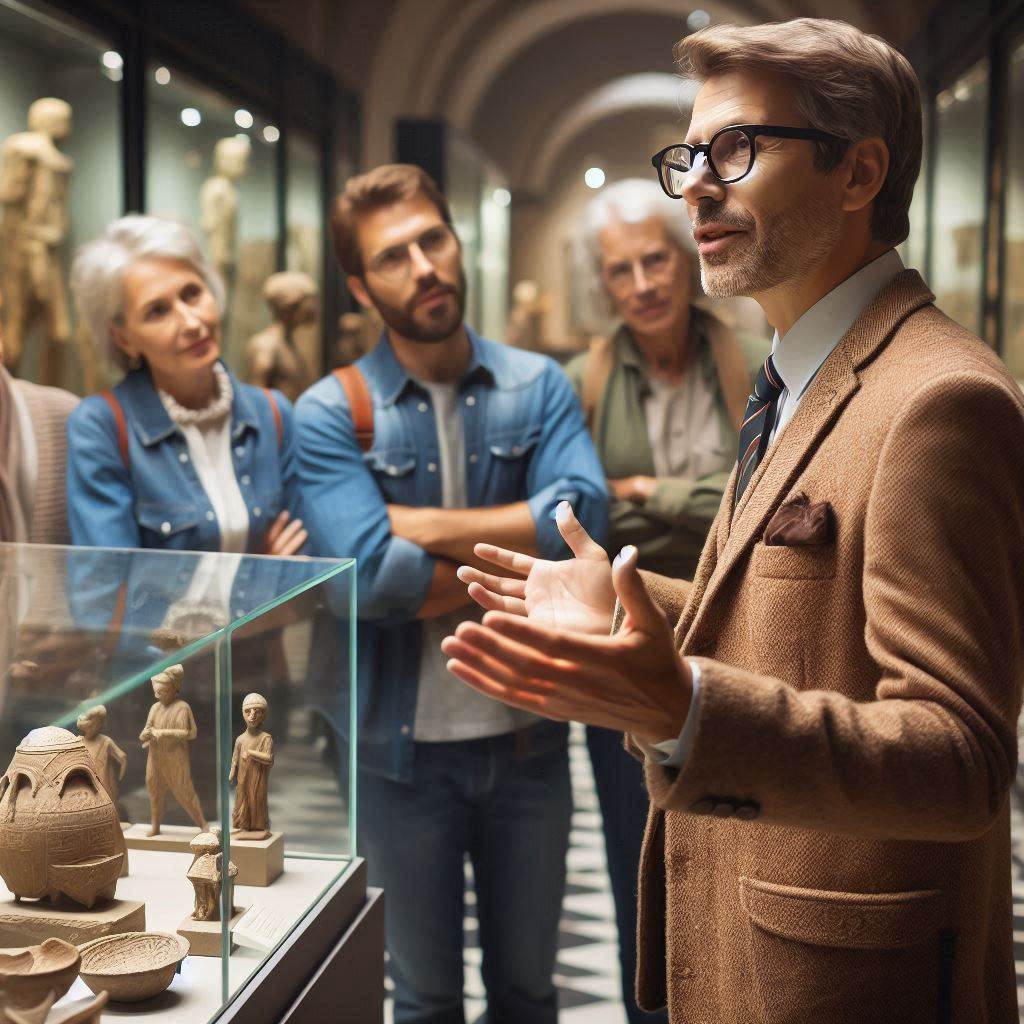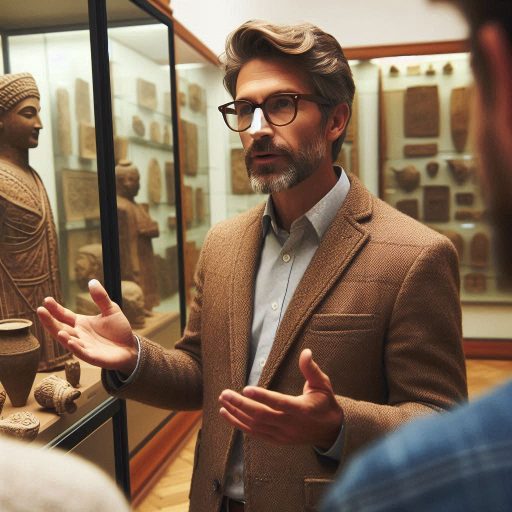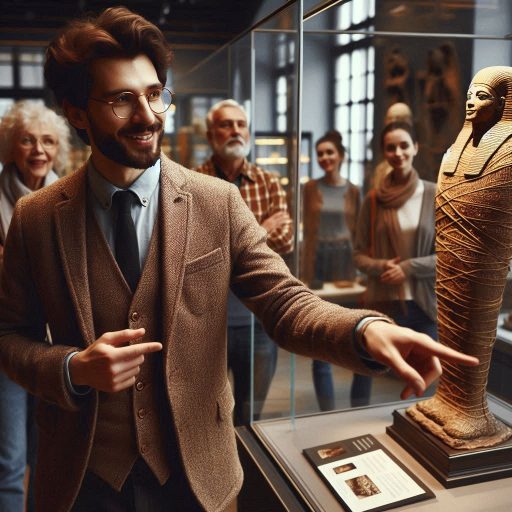Introduction
Museum curation plays a vital role in preserving culture and history.
Curators carefully select, organize, and interpret collections for public enjoyment and education.
They engage audiences by presenting artifacts in meaningful ways.
With museums evolving, the demand for skilled curators has increased significantly.
Taking museum curation courses and certifications equips individuals with essential knowledge and skills.
These programs provide valuable insights into collection management, exhibition design, and educational programming.
They cover topics like art history, conservation techniques, and audience engagement strategies.
Furthermore, online courses offer flexibility and accessibility.
Aspiring curators can learn at their own pace while balancing personal and professional commitments.
Certifications enhance credibility and can set candidates apart in the job market.
By completing these courses, individuals develop a deeper understanding of museum operations and best practices.
They also gain practical experience through projects and case studies.
Investing in museum curation education enriches both personal and professional growth.
It prepares individuals to contribute meaningfully to the museum field, fostering a greater appreciation for culture and history.
Engaging in this journey opens doors to exciting career opportunities in various institutions worldwide.
Overview of museum curation courses online
Museum curation courses online provide an excellent opportunity for anyone interested in the field.
These courses offer flexible learning options for aspiring curators.
They cover various aspects of curation, including exhibition design, collection management, and audience engagement.
Online courses are ideal for busy professionals or students seeking to enhance their skills.
They allow learners to study at their own pace from anywhere in the world.
Types of Courses Available
Many types of museum curation courses exist online.
Some focus on foundational skills, while others dive into specialized topics.
Introductory courses provide a broad understanding of museum practices.
Specialized courses often explore subjects like digital curation or conservation techniques.
Many programs also offer certificate courses for specific skills.
These short courses often take only a few weeks to complete.
Advanced degree programs are available for those seeking in-depth knowledge.
Online master‘s degrees in museum studies or related fields are increasingly popular.
They usually combine theoretical knowledge with practical skills.
Additionally, some courses may focus on specific types of museums, like art or natural history.
This specialization can enhance job prospects in niche areas.
Accredited Institutions Offering Online Courses
Several accredited institutions provide online museum curation courses.
Renowned universities and colleges offer programs that meet industry standards.
Institutions like Johns Hopkins University and the University of California, Berkeley, have established strong online offerings.
They ensure that students receive quality education through expert instructors and robust curricula.
Moreover, specialized organizations like the American Alliance of Museums (AAM) offer online courses.
These courses often align with current industry practices and standards.
The AAM also provides resources for networking and career development.
This connection enhances the learning experience and prepares students for real-world challenges.
Online platforms like Coursera and edX feature courses from accredited universities.
These platforms collaborate with universities to offer high-quality content.
Learners can access courses from institutions worldwide, expanding their options.
They provide opportunities for collaboration and learning from diverse perspectives.
Benefits of Taking Online Courses for Museum Curation
Taking online courses in museum curation offers numerous benefits.
Flexibility ranks as one of the biggest advantages.
Students can balance their studies with work or other commitments.
They can access materials and lectures at their convenience.
Cost-effectiveness is another significant benefit.
Online courses often cost less than traditional in-person programs.
This affordability opens doors for more students to enter the field.
Many programs also offer financial aid options, further reducing barriers.
Moreover, online learning promotes self-discipline and independence.
Students must take responsibility for their learning.
This skill is valuable in the professional world.
Additionally, online courses provide access to a global community of learners.
This diverse network fosters collaboration and idea exchange.
Students gain essential digital skills through online learning.
Familiarity with online tools and platforms enhances employability.
As museums increasingly embrace technology, these skills become vital.
Online museum curation courses provide an accessible, flexible, and enriching learning experience.
Read: Top Skills Needed for a Successful Character Designer
Popular Online Museum Curation Courses
The rise of online education has transformed how people learn about museum curation.
Several reputable institutions offer online courses and certifications in this field.
These courses provide aspiring curators with essential skills and knowledge.
Below are some popular options available to learners today.
Specific Courses Available
Museum Studies Certificate
Offered by the University of California, Irvine, this certificate covers museum history, collections management, and exhibition design.
Students complete eight courses over two years.
This program offers a solid foundation for future curators.
Online Museum Studies Program
The George Washington University offers this program.
It explores various aspects of museum work, including fundraising and community engagement.
Students complete the program in one year, making it suitable for those with busy schedules.
Curatorial Practices Course
This course, available through Coursera, focuses on contemporary curatorial practices.
It features insights from industry professionals and includes interactive assignments.
Learners engage with real-world scenarios to develop their skills effectively.
Introduction to Museum Studies
The Massachusetts Institute of Technology (MIT) provides this introductory course.
It explores the roles of museums in society and their impact on communities.
This course is an excellent starting point for anyone interested in the field.
Museum Curation Specialization
Offered by the University of Illinois, this specialization consists of four courses.
It covers exhibition planning, audience engagement, and digital curation.
Students gain practical skills needed for modern curatorial work.
Reviews and Ratings of These Courses
Many of these courses have received positive reviews from students.
Course ratings often reflect the quality of the material and instruction.
For instance, the Museum Studies Certificate at UC Irvine has a rating of 4.7 out of 5 stars.
Students praise the course for its comprehensive content and knowledgeable instructors.
Similarly, the Curatorial Practices Course on Coursera has garnered an average rating of 4.6 stars.
Students appreciate the real-world examples and interactive format.
Many claim it enhances their understanding of curatorial work significantly.
Testimonials from Previous Students
Numerous students have shared their experiences with these courses.
‘The Museum Studies Certificate opened doors for me in the curatorial world,‘ says one graduate from UC Irvine.
‘The knowledge I gained is invaluable.‘
Another student from the George Washington University program states, ‘This course taught me how to engage with diverse communities effectively.‘
They felt more prepared to contribute to the museum field after completing their studies.
A learner from the MIT course expresses similar enthusiasm: ‘I never realized how impactful museums could be until this course.
It changed my perspective completely.‘
Many students highlight the supportive community within these programs.
They appreciate the networking opportunities and the chance to connect with like-minded individuals.
These courses provide a valuable stepping stone for those pursuing a career in museum curation.
Online museum curation courses offer aspiring curators the chance to develop their skills.
With various options available, students can find a program that suits their needs.
Positive reviews and testimonials highlight the effectiveness of these courses.
As the field continues to evolve, these educational opportunities will play a crucial role in shaping future curators.
Read: Career Paths in Ceramic Art and Design
Specializations in Museum Curation
Museum curation is a diverse field that encompasses various specializations.
Each specialization focuses on different aspects of managing and interpreting collections.
By understanding these areas, you can make informed choices about your career path.
Transform Your Career Today
Unlock a personalized career strategy that drives real results. Get tailored advice and a roadmap designed just for you.
Start NowDifferent Areas of Specialization within Museum Curation
Art Curation
Art curators manage collections of paintings, sculptures, and other visual arts.
They often organize exhibitions that highlight specific artists or themes.
This specialization requires a strong understanding of art history and contemporary practices.
Natural History Curation
Natural history curators oversee collections of biological and geological specimens.
They play a crucial role in educating the public about biodiversity and the natural world.
This specialization often involves research and collaboration with scientists.
Cultural Heritage Curation
Cultural heritage curators focus on preserving and interpreting artifacts that reflect human history.
They work with archaeological finds, ethnographic objects, and historical documents.
This specialization emphasizes the importance of cultural context in understanding artifacts.
Science Curation
Science curators manage collections related to various scientific disciplines.
They may oversee geological specimens, biological collections, or technological artifacts.
This specialization often involves collaboration with researchers and scientists to enhance public understanding of science.
Digital Curation
Digital curators manage online collections and digital resources.
They create virtual exhibitions and engage audiences through digital platforms.
This specialization requires skills in technology and an understanding of digital storytelling.
Importance of Choosing a Specialization
Choosing a specialization in museum curation is crucial for several reasons.
First, it allows you to develop expertise in a specific area.
This expertise can enhance your career prospects and make you a valuable asset to museums.
Second, a specialization helps you connect with like-minded professionals.
Building relationships with others in your field can lead to collaboration and mentorship opportunities.
Networking within your specialization can open doors to new experiences and projects.
Specializing allows you to engage deeply with your passion.
Whether you love art, science, or history, focusing on a specific area can bring fulfillment.
Your passion will reflect in your work and inspire others.
How Online Courses Cater to Different Specializations
Online courses in museum curation cater to various specializations.
Many institutions offer programs tailored to specific fields.
These courses provide foundational knowledge and advanced skills in your chosen area.
For example, if you’re interested in art curation, you can find courses focusing on art history, exhibition design, and collection management.
Similarly, natural history enthusiasts can enroll in courses covering specimen collection and conservation techniques.
Many online courses also offer flexible schedules.
This flexibility allows you to balance your studies with other commitments.
You can learn at your own pace while gaining valuable knowledge and skills.
Additionally, some platforms offer interactive elements.
These elements include discussions with industry professionals and virtual workshops.
Engaging with experts enhances your learning experience and builds your professional network.
Choosing a specialization in museum curation is essential.
Each area offers unique opportunities and challenges.
Online courses provide the resources you need to excel in your chosen field, ensuring you are well-equipped for a successful career.
Read: Freelance Character Design: How to Get Started

Certification Options for Museum Curation
Museum curation is an evolving field.
Obtaining a certification can enhance your credentials and open new career paths.
Several online programs offer specialized courses that provide comprehensive training.
They help you gain knowledge in art history, conservation, and exhibit design.
This training ensures you understand the nuances of curating exhibits and managing collections.
Different Certification Programs Available Online
Various institutions offer certification programs in museum curation.
Some universities provide online courses that cater to different skill levels.
The American Alliance of Museums (AAM) offers an online certification that focuses on best practices in the field.
This program emphasizes ethics, educational strategies, and community engagement.
The University of California, Berkeley, offers a certificate in museum studies.
This program covers topics like exhibition design, collections management, and museum administration.
Students gain practical skills through real-world projects and case studies.
The George Washington University also offers a graduate certificate in museum studies.
This program delves into the theoretical foundations of curatorial practices.
Many organizations offer specialized workshops and courses.
These may focus on digital curation, fundraising, or community outreach.
Programs like these cater to professionals seeking to enhance specific skills.
Requirements for Obtaining Certifications
Certification requirements vary by program.
Most programs require a high school diploma or equivalent for entry.
Some may prefer candidates with a bachelor’s degree in a related field.
Relevant experience in museums or cultural institutions is often beneficial.
For many programs, applicants must submit a personal statement outlining their interests.
Letters of recommendation can strengthen your application.
Some programs may require a portfolio showcasing your previous work.
This could include projects, research, or curatorial proposals.
Completion of coursework is usually necessary for certification.
This may involve attending lectures, participating in discussions, and completing assignments.
Many programs also include a capstone project that allows you to apply your knowledge.
Career Opportunities with Certifications in Museum Curation
Earning a certification in museum curation can significantly enhance your career prospects.
With this credential, you can pursue roles as a museum curator or exhibit designer.
Many museums seek candidates with specialized training to manage collections and develop exhibitions.
You may also find opportunities in educational programming or community outreach.
Certification can position you for leadership roles within museums and cultural organizations.
Some graduates move into positions in arts administration, grant writing, or cultural policy.
In addition, certified professionals often have an edge in competitive job markets.
Employers value candidates who have demonstrated a commitment to ongoing education.
Certifications also indicate a level of expertise that can make you stand out.
Pursuing a certification in museum curation can be a transformative step.
It can deepen your understanding of the field and broaden your skill set.
As the museum landscape evolves, certified professionals will play a crucial role.
Investing in your education now will prepare you for the future of museum curation.
Read: Career Paths: Becoming a Professional Character Designer
Explore Further: How to Keep Your Packaging Designs Fresh and Modern
Comparison Between Online and Traditional Museum Curation Courses
The world of museum curation has evolved, offering both online and traditional classroom-based courses.
Each option presents unique opportunities for students aspiring to become curators.
Online courses offer flexibility, while traditional courses provide face-to-face learning experiences.
When deciding which to pursue, understanding the differences and benefits of each can be crucial.
Online museum curation courses are accessible from anywhere, allowing students to learn at their own pace.
This flexibility is a major advantage, especially for those balancing work, study, or family commitments.
Many online programs provide a range of learning formats, such as video lectures, interactive modules, and peer discussions, ensuring a rich educational experience.
Traditional courses, on the other hand, offer an immersive environment where students can interact directly with their peers and instructors.
This face-to-face engagement is invaluable for building relationships with professionals in the field.
Traditional courses also provide hands-on experience with actual museum artifacts, something that online courses may struggle to replicate.
The in-person networking opportunities also give students access to mentors and potential job leads.
Pros and Cons of Online Museum Curation Courses
While online courses offer convenience, they do come with some drawbacks.
One challenge is the lack of physical interaction.
In traditional settings, students have direct access to resources such as museum collections, and the absence of these in online formats can limit experiential learning.
Also, online courses may require a high degree of self-discipline.
Since there are no set class times, it is easy to fall behind without proper time management.
However, online courses have their benefits.
They are often more affordable than traditional courses, reducing costs related to commuting, accommodation, and physical materials.
Online learning also eliminates geographical constraints, making it possible for students from all over the world to enroll.
Additionally, many online programs feature forums and live webinars where students can interact with experts, though these interactions may not match the depth of in-person experiences.
Benefits of Traditional Classroom-Based Museum Curation Courses
Traditional classroom-based courses excel at providing practical experience.
Students benefit from access to museum collections, where they can study artifacts and curation techniques firsthand.
The physical presence of instructors allows for immediate feedback and deeper discussion.
In addition, being part of a learning community fosters collaboration and peer learning, which can help students develop broader perspectives.
Another advantage of traditional courses is the structure.
With fixed class schedules, students are less likely to procrastinate.
The consistent interaction with faculty members and fellow students also builds a strong support system, which is important for those new to the field.
Factors to Consider When Deciding Between Online and Traditional Courses
When choosing between online and traditional courses, it‘s important to assess your personal needs.
Flexibility is a key benefit of online learning, while traditional courses offer direct, immersive experiences.
Consider your schedule, budget, and career goals.
Online courses are great for self-motivated learners, while traditional courses suit those who prefer hands-on experience and face-to-face interaction.
By understanding your learning style and long-term aspirations, you can make the best choice for your museum curation career.
Tips for Success in Online Museum Curation Courses
Enrolling in an online museum curation course can be a transformative experience.
To make the most of it, you need to adopt effective strategies.
Here are some tips for success.
Time Management Strategies
Time management plays a crucial role in your success.
Set aside specific blocks of time for your coursework.
Establish a routine that works for you.
Stick to a consistent schedule to maintain momentum.
Break larger assignments into manageable chunks.
This helps prevent overwhelm and keeps you on track.
Use tools like calendars and planners to organize your tasks.
Reminders can prompt you to stay focused.
Prioritize your assignments based on due dates and complexity.
This will ensure that you allocate your time effectively.
Avoid procrastination by tackling challenging tasks first.
Completing these early can boost your confidence and motivation.
Transform Your Career Today
Unlock a personalized career strategy that drives real results. Get tailored advice and a roadmap designed just for you.
Start NowStudy Techniques for Online Learning
Developing effective study techniques is essential for online learning.
Create a dedicated study space free from distractions.
A quiet environment helps improve focus and retention.
Use active learning techniques to enhance understanding.
Summarizing course material in your own words reinforces learning.
Engage with multimedia resources, such as videos and podcasts, to reinforce concepts.
Participating in online discussions can deepen your understanding of topics.
Collaborate with classmates for group study sessions.
Sharing insights and perspectives enriches the learning experience.
Practice self-assessment by regularly quizzing yourself on key concepts.
This technique helps reinforce knowledge and identify areas for improvement.
Resources for Further Learning and Development
Take advantage of additional resources to enrich your learning journey.
Explore online platforms like Coursera and edX for supplementary courses.
Many universities offer free resources on various aspects of museum curation.
Engage with online forums and social media groups dedicated to museum studies.
Networking with peers and professionals can provide valuable insights and opportunities.
Access webinars and online conferences hosted by museum organizations.
These events often feature industry experts discussing current trends and practices.
Utilize digital libraries and archives to conduct research on topics of interest.
This research can deepen your understanding and enhance your assignments.
Reading relevant books and articles also broadens your perspective.
Seek out recommendations from instructors or industry professionals.
Joining professional organizations can provide access to exclusive resources and networking opportunities.
Staying connected with the museum community fosters ongoing learning.
Remember that learning doesn‘t end with course completion.
Continually seek opportunities to expand your knowledge and skills.
Set personal goals for your development within the museum field.
Succeeding in online museum curation courses requires commitment and effective strategies.
By managing your time wisely, employing active study techniques, and leveraging available resources, you can excel in your coursework.
Embrace the journey of learning and stay curious about the world of museum curation.
Your passion and dedication will pave the way for a successful career in this dynamic field.
Conclusion
Taking museum curation courses and certifications online is essential for aspiring curators.
These programs offer valuable skills in curation and collection management.
They also enhance your knowledge of art history and exhibition design.
Online courses provide flexibility, allowing you to learn at your own pace.
You can access resources and expert insights from anywhere in the world.
Investing in your education boosts your credentials in the competitive museum field.
It also opens doors to networking opportunities with industry professionals.
Online certifications can help you stand out in job applications.
They demonstrate your commitment to professional development and lifelong learning.
As museums evolve, so do the skills needed for successful curation.
Stay current with trends and technology by enrolling in an online course.
Explore the many options available that cater to various interests and experience levels.
Whether you’re a beginner or an experienced professional, there‘s something for everyone.
Embrace the opportunity to expand your expertise and advance your career.
Discover online museum curation courses today and take the next step in your professional journey.
Your future in curation awaits!




